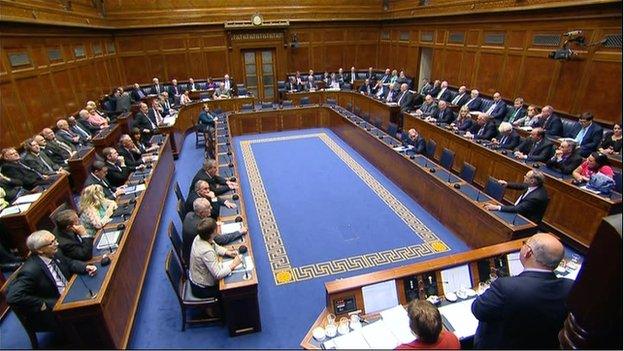Stormont - the alternatives to mandatory coalition
- Published
- comments

If Stormont is "not fit for purpose", as Northern Ireland's First Minister Peter Robinson has claimed, what are the possible alternatives, should the Westminster government convene a fresh round of negotiations?
1. Abolishing the mandatory coalition system and the designation of MLAs as "unionist" ,"nationalist" or "other". Ending the controversial cross-community vetoes, known as petitions of concern and forming devolved governments that take decisions on the basis of simple majority votes.
This option would certainly make for much quicker decision-making and please those who do not like political representatives being forced to declare themselves in one camp or the other. However, nationalists would see it as a return to old-style Stormont majority rule within an entity - Northern Ireland - the borders of which they dispute. So there is no way nationalists would agree.
2. Abolishing the mandatory coalition system and the designation of MLAs. Inviting those willing to govern to form a voluntary coalition, while other parties go into opposition. Ensuring both communities have a say in forming governments and making key decisions by introducing a "weighted majority" system, requiring initiatives to secure 65% or 70% backing from MLAs.
This is the most frequently suggested alternative to the current system. The advantage is that - just as at the Dáil (Irish Parliament) and Westminster - parties would have to agree a binding programme of government before they enter a voluntary coalition. Governments could be voted in and voted out of office. Governing coalitions would be more likely to have a better sense of collective responsibility.
However, Sinn Féin has always been sceptical about the voluntary coalition option as it viewed it as a cover for unionists to exclude republicans from office and try to govern with the assistance of the nationalist Social Democratic and Labour Party (SDLP).
Sinn Féin's growth (currently with 29 MLAs they hold about 27% of the voting power at Stormont) and the SDLP's decline makes it hard to envisage a weighted majority system that could operate without republicans. In any case, when it comes to welfare reform - the issue that prompted Peter Robinson's latest initiative - there is no sign that the SDLP would contemplate reversing its current opposition.
3. Return to Direct Rule.
Ministers appointed by Westminster straddle several departments, ordering civil servants to handle their day-to-day administration and to stick within Treasury spending policies.
As part of the 2006 St Andrews agreement, the Westminster government rescinded the laws that allowed it to step in at short notice and suspend the Northern Ireland Assembly and its Executive. However, in the event of a complete breakdown of power-sharing, the Northern Ireland Office would probably have no choice but to rush through emergency laws enabling the secretary of state to take control.
Direct rule would mean that the UK government would be able to rubber stamp the introduction of its welfare reforms. Sinn Féin, the SDLP and the other critics of the welfare changes could say that they had fought the austerity agenda as long and hard as possible, and therefore cannot be blamed. Mr Robinson's Democratic Unionist Party (DUP) would argue that a devolved government should have introduced the reforms itself, but that their imposition by direct rule is preferable to budget cuts, that could lead to large-scale public sector job losses.
Whether the regional flexibilities already negotiated on issues like the spare room subsidy - which critics have dubbed the bedroom tax - are preserved may depend on the attitude of London ministers and continuing debate at Westminster about ameliorating the impact of the policy.
However, any prolonged period of direct rule risks creating a political vacuum and providing succour to dissident republicans who have long argued that Sinn Féin should never have agreed to prop up any Stormont administration.
4. A border poll
As the Westminster government is not going to make an instant response to Mr Robinson, the debate about alternatives to Stormont will take place as the UK deals with the fall-out of either a "Yes" or "No" vote in the Scottish independence referendum.
If unionists are now arguing that Stormont is not working, republicans might well respond that the answer lies two hours down the road in Dublin. A united Ireland is undoubtedly an alternative to the current mandatory coalition, but if a border poll is ever triggered, the future of the welfare system will only be a single item on a very long agenda.
- Published9 September 2014

- Published9 September 2014

- Published9 September 2014
